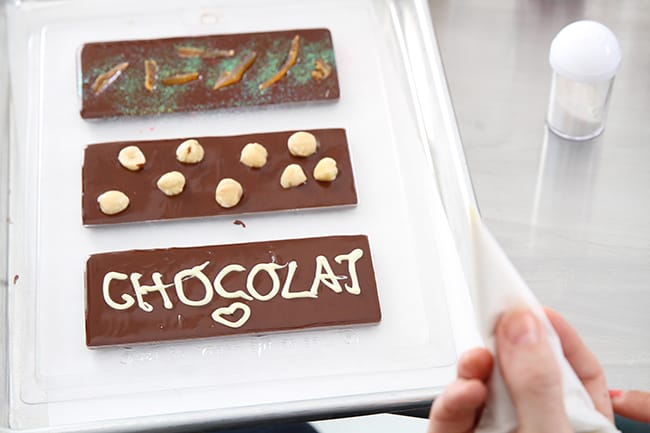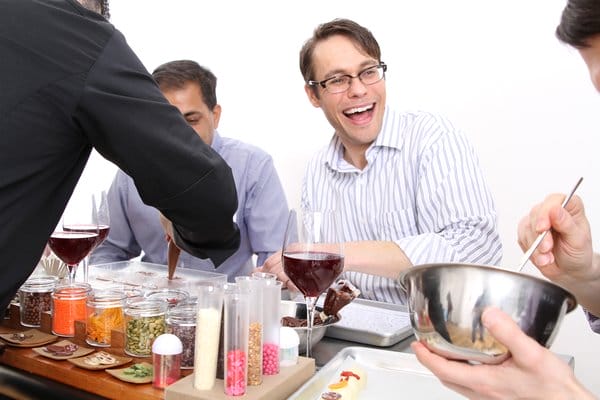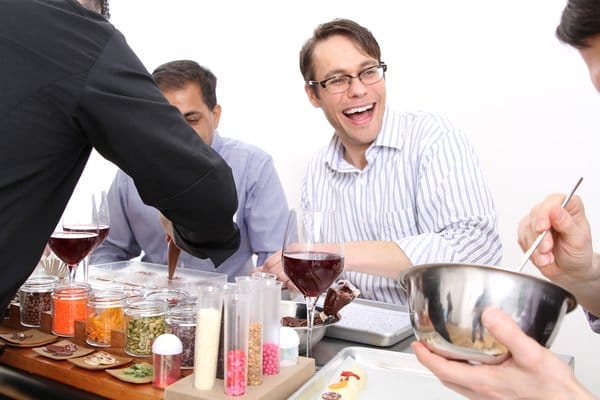
Photo credit: Voilà Chocolat
“It doesn’t take three Ivy League MBAs to open a chocolate store,” says Elaine Boxer WG02.
But it may take two Wharton MBAs—Boxer as chief marketing officer and CFO Bojan S. Stoyanov WG99—as well as founder Peter Moustakerski’s Columbia MBA and a master chocolatier, Christophe Toury, to create what could become the “Build-A-Bear” of chocolate DIY. The retail shop where kids (and grownups) can stuff and design their own plush toy now has around 250 stores, and the team at Voilà Chocolat currently has one store in New York City, which opened at the end of 2014. But leave it to three MBAs and a master chocolatier to dream big and fast. They could soon have stores number two and three open in Manhattan, and international opportunities are solidifying as we speak—with the goal being expansion to 50 stores in a half-dozen years.
One ingredient to their success when it comes will be that they are tapping into a wider pop-culture trend: do-it-yourself (DIY). Moustakerski had his startup epiphany while at a birthday party with his daughter at a pottery making store, and he realized he could combine his passion for gourmet chocolate with the “transcendent moment” experienced by both kids and adults when working with their hands.
“People really want to get into a craft and have a visceral–tactile experience,” Boxer says.
They can do so—with chef-grade chocolate and other sweet ingredients—at the store at 221 West 79th Street, either by dropping in or by organizing a group event or party (as the Wharton Club of New York did recently). Voilà Chocolat’s trained chocolatiers provide step-by-step guidance. Most importantly, guests can take home their creations, or eat them on the way home.

Wharton alumni have already enjoyed the DIY chocolate experience at Voilà Chocolat. In this case, Ram Rajagopal WG02 (left), Michael Batten WG01 (center) and David Sturek WG01 (not pictured). Photo credit: Voilà Chocolat.
Other ingredients to success are the company’s founding values, particularly sustainability and social responsibility. Chocolate, you see, is a dirty business. We won’t get into too many details because it would depress the typical American chocolate eater. But we will say, as Boxer did, how insatiable demand for chocolate has distorted the appreciation of cost, leading to an “undifferentiated commodity” that leaves the end user happy but the farmer at the other end living in poverty or even having to resort to child slavery to make ends meet.
“All mass-produced chocolate contains human exploitation,” Boxer puts it.
Can you taste the environmental degradation when you bite into that chocolate bar bought at your supermarket’s checkout line?
With that massive demand for cheap chocolate comes the urge for yield “any which way you can”—often at the expense of taste, variety, natural ingredients and the cocoa trees themselves. Boxer warns that chronic diseases are wiping out large swaths of the crop, and the GMO advocates’ answer is a variety called CCN 51 that produces even worse chocolate.
At Voilà Chocolat, besides an impeccable DIY experience, they offer a “small but powerful anecdote.” First, they educate their customers about what constitutes good chocolate and how it ought to be considered a luxury good—albeit an affordable one.
The company also actively engages in a “virtuous cycle” by working with San Francisco-based Guittard Chocolate Company. The confectioner sources hand-selected and fairly traded cacao beans directly from growers.
Boxer, who came to Voilà Chocolat by way of a 20-year corporate marketing career and a Wharton friend who introduced her to the company’s original head of operations, has trouble containing her enthusiasm when discussing the potential to do good by doing well in the chocolate space—by “bringing the magic of making gourmet chocolates to the average person.”
It doesn’t take three Ivy League MBAs to create that magic. For that, we’ve thrown in the master chocolatier.


























